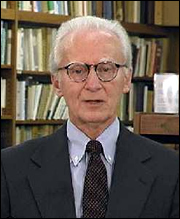
Ralph McInerny, professor of philosophy, director of theJacquesMaritainCenterand Michael P. Grace Professor of Medieval Studies at the University of Notre Dame, can be pointed in his disapproval of recent trends in his chosen academic discipline.Philosophy itself has now become a form of Radical Chic,he says, deriding those comfortably employed philosophers whofly about the world to talk to one another and deny that there is a world to fly around or that anything they or anyone else might say makes sense.
Not that McInerny has anything against flying around the world.He recently returned from a weekend trip toRome, where he stayed at the Domus Sanctae Marthae, the residential facility used by the cardinals for the recent election of Pope Benedict XVI.The purpose of his visit was a meeting of the Pontifical Academy of St. Thomas, a Vatican-sponsored association of scholars devoted to the study and promulgation of the thought ofSaint Thomas.Its a great honor to be a member,he said, almost shyly addingand the only thing Ive ever been really proud of.He had given a paper onPhilosophy and the Sacred,and was pleased to be the meetings first speaker.Its always best to go first,he said.When you have to say something after everyone else has said everything, you become a sort of footnote.
At the half-century mark of a multifaceted career, McInerny would make a formidable footnote.In addition to having taught and directed research institutes at Notre Dame for the last 50 years, he has written more than two dozen scholarly books and hundreds of essays on philosophy; edited a series of translations ofSt. Thomas; founded, edited and written for Crisis and Catholic Dossier magazines; written more than 50novels, including the Father Dowling series and several murder mysteries set on the Notre Dame campus; served as president of the American Catholic Philosophical Association, the Metaphysical Society, the American Maritain Society and the Fellowship of Catholic Scholars; given lectures in numerous countries on three continents; served as a commentator on Catholic affairs on numerous television and radio programs; received a White House appointment to serve on the Presidents Committee on the Arts and Humanities; and served as a mentor for a new generation of contemporary Thomist thinkers.
Despite, or perhaps because of, such far flung activity and acclaim, McInernys enjoyment of the familiar surroundings and people of Notre Dame is all the more conspicuous.He positively savors the ambience of the University Club, where he is a regular diner and where many of his fictional characters have plotted and unpuzzled murders."I love it here. I can’t imagine being anywhere else,he said of the campus on which he had never set foot until he was hired by the Universitys then-new president, Rev. Theodore M. Hesburgh, C.S.C., in 1955.Shaking his head with affectionate bemusement he added,According to Father Hesburgh, hes enjoyed disagreeing with me ever since.All six of his children have attended Notre Dame and his late wife, Connie, who died three years ago, is buried in Cedar Grove cemetery.McInerny is decidedly one of those Notre Dame characters of whom his friend and colleague, Professor Frank OMalley once said,Their blood is in the bricks.
If Thomism is not exactly a household world in contemporary academia, McInerny dismisses the notion that it is a marginal position in the discipline of philosophy because so few positions of any kind are being held to begin with.
The great questions, secularized, become trivial:markers in a game,he wrote inThe Very Rich Hours of Jacques Maritain,his recent biography of the French Thomist philosopher.How many modern philosophers would one want to be alone with in an elevator, let alone in conversation for half an hour?
Such a derisive question could never be asked of RalphMcInerny.
TopicID: 12362